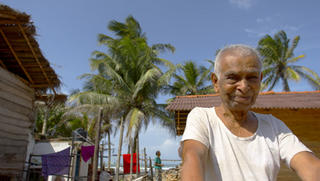
I have heard people complain about the disaster response and the various NGO's who have bene involved. I hear things like the futility of building wooden houses because they are not safe from thieves, that too few houses are being built to give everyone a home, that people have to wait too long for their home, that agencies demand too much money or labor from the home owner, that some of the roofing is made of tin or asbestos sheets, that people are afraid of returning to the their land near the water.
To all those people who wish to bag the disaster response I simply say, come over and see if you can do better - there is brilliant work being achieved here and however inadequate the response may seem, the response has been vital and life saving. The majority of aid recipients have in fact been very appreciative but they naturally want more.
People have been very afraid to return to the shoreline and with good reason. These individuals have experienced horrendous trauma and loss, but they are moving back to their land and rebuilding with the encouragement of NGO's. In some cases aid agencies have decided to build homes before the people return. Once a house is built the family will change their mind and be happy to start building a life around the new home. Often the biggest hurdle is getting just one family to return - everyone is happy to go back so long as others go back too. No one wants to be the first.
The handout mentality in Sri Lanka is regretably common and the idea of contributing to the work or cost of the rebuilding is a genuine hurdle for many people - they believe the government should replace their home. Aid agencies usually operate around a system of owner investment which requires money to be paid back (interest free and at extemely small rates) and demands the owners to work on the house as well. For people who are disposessed of home and family the need to work and earn money is not insignificant of course, but the 'sweat equity' can be contributed by family and community in addition to the owners themselves. The fact is that agencies can build a lot more houses when the owners are involved, and the finished product is treated with far more respect and possession when the family helped to build it. The bitter reality of international aid is that often we can only help those who can help themselves.
The quality of houses being built is a difficult one to address. What standard of home should be built for any given family? Should they all get the same standard home or should different standards apply to people with different standing within their community. If you improve the quality of building for one family then you may be denying a house at all for another. It has been suggested to me that community leaders deserve a home that reflects their position and the service they have given to their community. It should therefore be in the hands of that very community to offer resources in accordance with that standing, rather than expecting the NGO's to differentiate.
Looking closely at the standard of homes built by various NGO's and by different divisions within a single agency you will find significant variations. The size of the home, the standard of roofing, the quality of finish, etc. One agency only recently stopped using asbestos roof tiles for example. The health risks are well known to western people but less so in Sri Lanka. But at the time the cost and availability of terracotta tiles was not practical and the projects would grind to a halt otherwise. The difficulty in managing construction costs has escalated as demand for basic materials and labor outstrips supply. Market forces comes into a play; a truck load of sand now costs triple what it did prior to the tsunami. This not only impacts the effectiveness of aid agencies but causes problems for anyone who wants to build whether tsunami affected or not. In most cases the permanent homes are designed to be extended upon easily should the owner have the means to do so, and the reality of having a real home that becomes the focus of rebuilding a normal life is far more important than comparing one house to another.
We all appreciate that victims of disasters are disadvantaged beyond comparison but let's not attack the very agencies and their volunteers who work day after day to improve the situation. They need your support more than ever.
(Read about building houses in Sri Lanka with Habitat for Humanity)
No comments:
Post a Comment